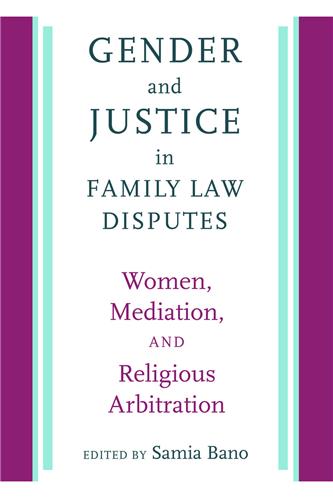Recently, new methods of dispute resolution in matters of family law—such as arbitration, mediation, and conciliation—have created new forms of legal culture that affect minority communities throughout the world. There are now multiple ways of obtaining restitution through nontraditional alternative dispute resolution (ADR) mechanisms. For some, the emergence of ADRs can be understood as part of a broader liberal response to the challenges presented by the settlement of migrant communities in Western liberal democracies. Questions of rights are framed as “multicultural challenges” that give rise to important issues relating to power, authority, agency, and choice. Underpinning these debates are questions about the doctrine and practice of secularism, citizenship, belonging, and identity. Gender and Justice in Family Law Disputes offers insights into how women’s autonomy and personal decision-making capabilities are expressed via multiple formal and nonformal dispute-resolution mechanisms, and as part of their social and legal lived realities. It analyzes the specific ways in which both mediation and religious arbitration take shape in contemporary and comparative family law across jurisdictions. Demarcating lines between contemporary family mediation and new forms of religious arbitration, Bano illuminates the complexities of these processes across multiple national contexts.


SAMIA BANO is a senior lecturer in law at the School of Oriental and African Studies, University of London.

Founded in 1971, Brandeis University Press is a nonprofit publisher dedicated to publishing innovative, high-quality books for a general audience, as well as scholarship that advances knowledge and promotes dialogue in the humanities, arts, and social sciences around the world.
© Copyright 2024, Brandeis University Press
Brandeis University Press
Goldfarb Library 69-235, MS 046
Brandeis University
415 South Street
Waltham, MA 02453
(781) 736-4547
pressinfo@brandeis.edu

Stay up to date with the newest titles and promotions from Brandeis University Press—while saving 20% on your first purchase.